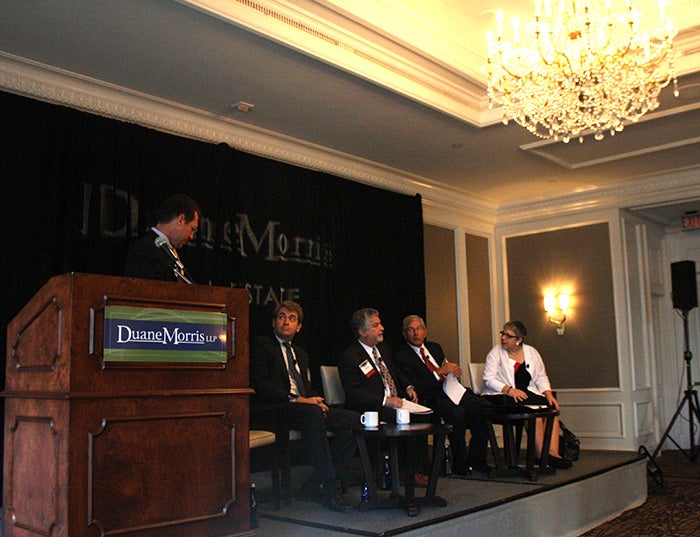In discussion with attorneys, planning leaders downplay immediate effects of new zoning code

Members of City Council and the Planning Commission addressed a roomful of real estate lawyers and developers in a seminar hosted by Duane Morris LLP Wednesday morning at the Westin Hotel in Center City. The seminar, entitled “What the Players in the New Zoning Code Expect Come August 22, 2012,” covered little ground unfamiliar to PlanPhilly readers, but proved interesting in its context. Having spent so much time over the last year trumpeting the benefits of the new code, the panelists spent much of Wednesday’s seminar discussing how little things will change—at least in the short term.
The panel included Councilman and former Zoning Code Commissioner Bill Green, Deputy Mayor Alan Greenberger, and former ZCC director Eva Gladstein. The discussion was moderated by Duane Morris partner Marc Brookman, who pointed out, by way of review, that the zoning process in Philadelphia is “one that developed more by practice and folklore than by real direction from the code.”
“I know that everyone is anxious about the future,” said Brookman, after introducing the panelists, “and the future, in this case, is the new zoning code.”
Gladstein then described—graciously, and for the millionth time, by our count—the five-year process of zoning reform, which began formally with the referendum creating the ZCC in 2007, and ended formally with the Mayor signing the new code into law last December.
“After we celebrated [the passage of the code], there’s been a lot of anxiety about what this really means,” Gladstein said.
Bill Green picked up a theme that he’s been emphasizing all along, which is that development is unlikely either to change or increase dramatically until after the district remapping is done. The Planning Commission is currently on a five-year timeline for remapping the entire city; Green wants to commit extra resources to the Commission so that it can be finished in two years.
“We are at the very beginning of a process that will make Philadelphia a place where people really want to do business,” Green said.
Green added that, until remapping is done, developers who want to build on land regulated by obsolete zoning will still have to do so by getting variances at the Zoning Board of Adjustment. And in the near term, at least, that process will happen the way it has for decades.
“Unless you’re doing something that is in the zoning permitted,” Green said, “all of the things you’re used to [at the ZBA] will continue.”
In the long run, Alan Greenberger said, the ZBA’s decision-making on variances should be tied much closer to proof of economic hardship than it has been traditionally.
“We don’t want [the ZBA] to be the de facto planning agency, which they have been for decades,” Greenberger said. “We don’t want them to talk about things that are not in the zoning code, which they have, from time to time, for decades.”
Licenses & Inspections recently released a draft of new regulations for the ZBA, which are intended to help guide that process.
Greenberger did point out that the new code should immediately reduce the number of variance cases that go before the ZBA, as it includes by-right regulations for various common and small-scale uses that aren’t allowed in the current code. For example, every time a homeowner wants to build a deck under the current code, he or she must get a variance. But the new code allows decks to be built by right as long as they meet certain size and placement regulations.
Bill Green concurred.
“Smaller developers can just [build by right],” Green said, “and hopefully remapping will bring that to the rest of the city.”
Panelists also downplayed the significance of Civic Design Review—at least as an impediment to development—pointing out that the review is non-binding, and has no regulatory power. Alan Greenberger said that he “hope[s] the Commission takes it seriously,” but that ultimately it can’t stop a large-scale, by-right development from going forward. Councilman Green also called attention to amendments he and Councilman Bobby Henon recently had passed which shorten the timeline for the CDR process.
Bill Green said that major developments on non-remapped land would continue to occur through spot zoning until all districts are remapped. Greenberger acknowledged that is the case, but said the Planning Commission would continue to “extend the logic” of any zoning re-designation beyond single parcels where possible. For example, the Commission recently worked with Councilwoman María Quiñones-Sánchez to extend the reach of a rezoning bill so that it would cover several square blocks in Norris Square rather than one particular parcel.
Wednesday’s seminar was an act of reassurance from the crafters of the new zoning code to the attorneys and developers who work with it daily that the transition to the new process will not be jarring or abrupt. But it was also a reminder that the days of following a development method built by “practice and folklore,” rather than law, are—hopefully, and gradually—coming to an end.
“The idea that you can propose anything,” said Alan Greenberger, “and somehow find a way out of [the code], needs to slow down, and eventually stop.”
Contact the reporter at jaredbrey@gmail.com and follow him on Twitter @jaredbrey
WHYY is your source for fact-based, in-depth journalism and information. As a nonprofit organization, we rely on financial support from readers like you. Please give today.



